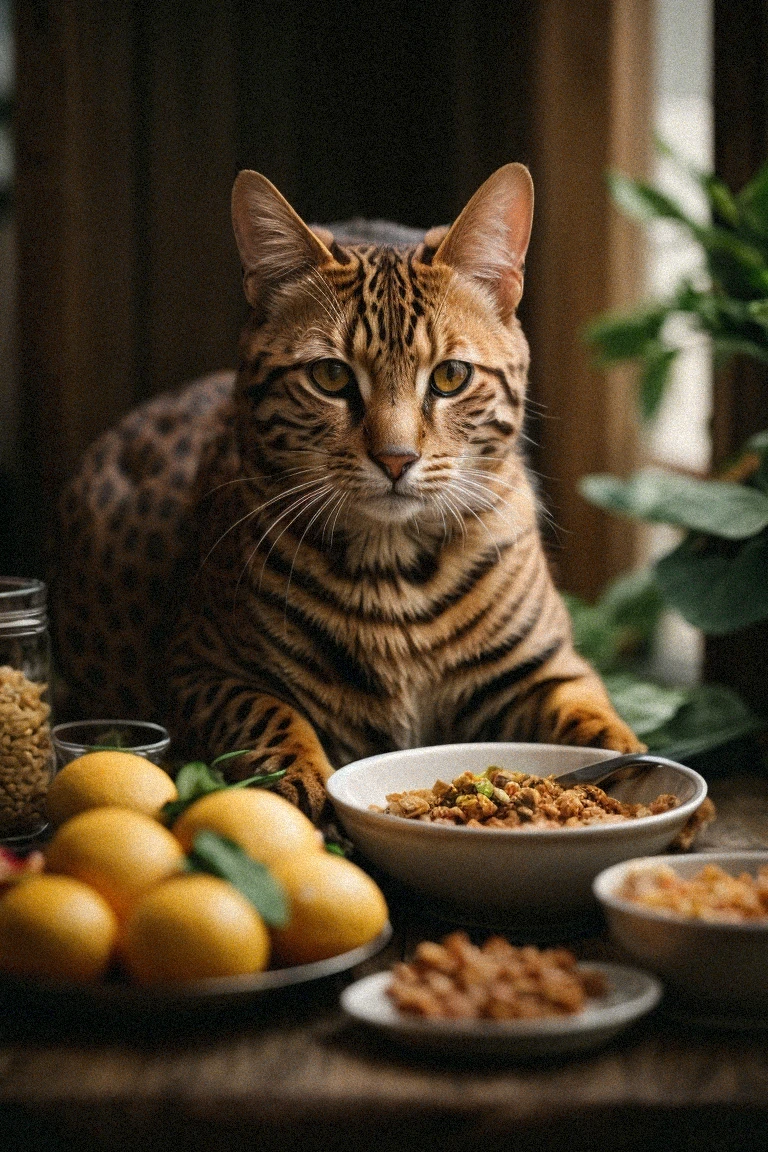Best Foods for a Bengal Cat's Diet

Bengal cats are a unique breed known for their exotic coat markings and energetic, athletic nature. When it comes to feeding a Bengal cat, it's important to provide a diet that matches their active lifestyle and nutritional needs. In this blog post, we'll explore the best diet and foods to feed a Bengal cat.
An Overview of the Bengal Breed
The Bengal cat originated from crossing small Asian leopard cats with domestic cats. This hybridization resulted in a breed that has the look of a wild cat but the temperament of a domestic pet.
Some key facts about Bengals:
- Highly energetic and require lots of exercise and playtime
- Love to climb, jump, and explore their environment
- Very intelligent and easy to train
- Thrive on interaction with their human families
- Medium to large in size
- Coat colors can range from brown spotted tabby to snow white
Their active nature and lean muscular build means that Bengals need a high-protein diet to stay healthy and fueled.
Key Nutrients for Bengals
When choosing foods and planning meals for a Bengal cat, there are three key nutrients to focus on:
Protein
As obligate carnivores, cats need a diet high in quality animal-based proteins. For Bengals, at least 40% of their diet should come from protein sources. This provides the amino acids essential for building and maintaining muscle mass.
Good protein sources include:
- Chicken, turkey, beef, lamb, duck, rabbit
- Fish like tuna, salmon, sardines
- Organ meats like liver and kidney
Fat
Fat delivers concentrated energy to fuel an active Bengal. Around 20-25% of their diet should come from fats and oils. Look for omega-3 and omega-6 fatty acids from fish, chicken fat, and plant oils.
Water
With their high activity level, Bengals need constant access to fresh, clean water. Canned or raw foods have high moisture content to aid hydration.
Best Foods for Bengals
There are several diet options that can meet the nutritional needs of a Bengal cat.
Raw Food Diets
Feeding raw, unprocessed meat, organs, and bones can be an excellent choice for Bengals. Freeze-dried or frozen raw cat food makes this diet convenient while still providing whole food nutrition. Potential benefits of a raw diet include:
- Mimics the natural carnivorous diet of wild cats
- Avoids processed ingredients, additives, and preservatives
- Supports dental health through raw bones and cartilage
- High moisture content from raw meat
When feeding raw, be sure to follow safe handling and storage guidelines. Speak with your veterinarian about creating a balanced raw diet or explore commercially available frozen and freeze-dried raw products.
High-Quality Canned Food
Canned cat foods typically have higher protein and moisture content than dry kibble. Look for grain-free varieties with named meat proteins like chicken, turkey, beef or fish. Canned food can be fed exclusively or mixed with some dry kibble.
Dry Kibble
For kittens or a mix of wet and dry food, select a kibble formulated for active cats with at least 40% protein and omega fatty acids from fish, chicken fat or plant oils. Avoid corn, wheat, soy, by-products, artificial colors and flavors.
Some recommended dry foods include:
- Orijen Cat & Kitten - Features fresh meats, fish, and eggs. Grain-free.
- Acana Wild Prairie - High protein from free-run poultry, nest-laid eggs, and freshwater fish.
- Wellness CORE Grain-Free - Contains turkey, chicken, salmon oil, fruits and veggies.
- Taste of the Wild Canyon River - Grain-free with trout and smoked salmon as the #1 and #2 ingredients.
Supplements
Some beneficial supplements to mix into food or give separately include:
- Taurine - Essential amino acid for heart and eye health.
- Digestive enzymes - Aid digestion and nutrient absorption.
- Fish oil - Provides anti-inflammatory omega-3s.
- Joint supplements - Chondroitin and glucosamine for joint health.
- Probiotics - Supports healthy gut flora.
When giving any supplement, follow label directions carefully.
Feeding Guidelines
Use these tips to feed your Bengal cat:
- Provide measured meals - Bengals are prone to overeating. Feed set amounts based on weight, age, and activity level.
- Split meals - Smaller meals a few times a day can help prevent gorging.
- Separate cats when feeding - Allows each cat to eat undisturbed and prevents resource guarding.
- Keep food and water bowls clean - Wash food and water dishes daily. Cats don't like eating or drinking from dirty containers.
- Exercise portion control - Adjust food amounts to maintain an ideal weight. Bengals love treats, so account for extras.
- Give variety - Rotate different protein sources to add interest to their diet.
By feeding a diet high in protein and moisture with the right balance of fats, supplements, and calories, you can fuel your Bengal cat's energetic lifestyle and keep them healthy and active for years to come. Work closely with your veterinarian if you have any questions when transitioning foods or formulating the optimal diet.